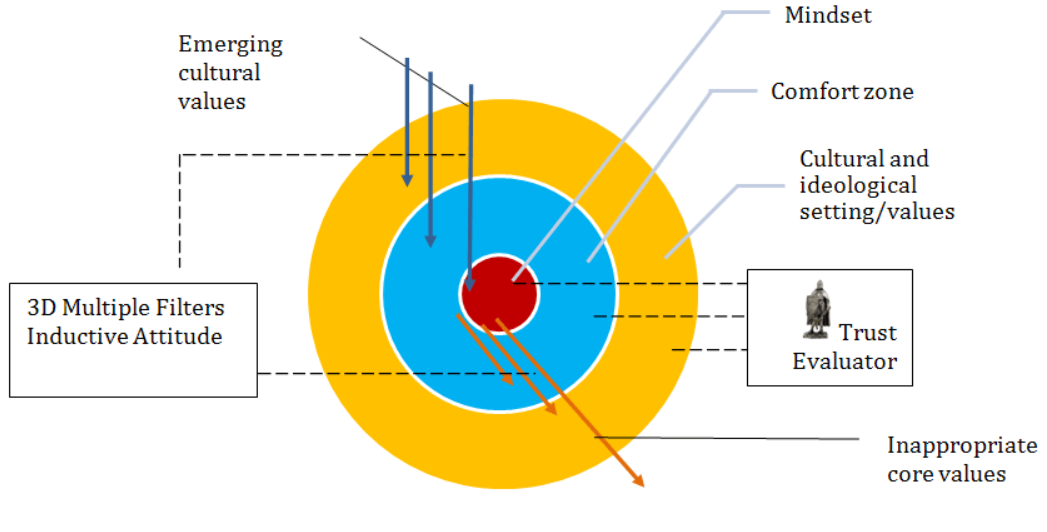The "Mindsponge mechanism" provides a way to explain how and why an individual observes and ejects cultural values conditional on the external setting. Thanks to the complexity and well-structuring, the mechanism has been used to develop various concepts in multiple disciplines. One such concept is "cultural additivity" (https://www.nature.com/articles/s41599-018-0189-2).
- mindsponge mechanism
- cultural values
- multi-filtering information process
- cultural additivity
- global mindset
Introduction
No matter the Earth is flat or spiky, globalization has passed the point of no return. In a fast-changing globalized world, increasing movements and exchanges between different regions, cultures, and populations worldwide are undeniable. Such movements and exchanges result in acculturation processes all over the world.
The Mindsponge mechanism is proposed by Vuong & Napier [1][2] for explaining how and why an individual "learns and unlearns" cultural values, which helps us better understand the complexity of acculturation in a global context.
Construct
The Mindsponge mechanism consists of five major components (see Figure 1):
- Mindset
- Comfort zone
- Multi-filtering information process
- Trust evaluator
- Cultural and ideological setting (or external environment)
Figure 1. The Mindsponge mechanism
Applied Contexts
The Mindsponge mechanism has been employed to develop various concepts and findings in multiple disciplines:
- Business Management and Economics [3][4];
- Health Science [5][6][7];
- Sociology [8][9];
- Scientometrics [10][11];
- Environmental Studies [12][13]
References
- Vuong, Q. H. (2016). Global mindset as the integration of emerging socio-cultural values through mindsponge processes: A transition economy perspective. In J. Kuada (Ed.), Global Mindsets (pp. 123-140). Routledge.
- Vuong, Q. H., & Napier, N. K. (2015). Acculturation and global mindsponge: An emerging market perspective. International Journal of Intercultural Relations, 49, 354-367. https://doi.org/10.1016/j.ijintrel.2015.06.003
- Vuong, Q.-H. (2016). Impacts of geographical locations and sociocultural traits on the Vietnamese entrepreneurship. SpringerPlus, 6, 1189. Available from: https://doi.org/10.1186/s40064-016-2850-9.
- Vuong, Q.H., Do, T.H. & Vuong, T.T. Resources, experience, and perseverance in entrepreneurs’ perceived likelihood of success in an emerging economy. Journal of Innovation and Entrepreneurship, 5, 18 (2016). https://doi.org/10.1186/s13731-016-0047-7
- Vuong, Q.-H. & Nguyen, T.-K. (2020). Vietnamese patients' choice of healthcare provider: in search of quality information. International Journal of Behavioural and Healthcare Research, 5(3-4), 184-212. Available from: https://doi.org/10.1504/IJBHR.2015.077678
- Nguyen, M., Le, T., & Meirmanov, S. (2019). Depression, Acculturative Stress, and Social Connectedness among International University Students in Japan: A Statistical Investigation. Sustainability, 11(3), 878. https://doi.org/10.3390/su11030878.
- Nguyen, M.-H., Serik, M., Vuong, T.-T., & Ho, M.-T. (2019). Internationalization and Its Discontents: Help-Seeking Behaviors of Students in a Multicultural Environment Regarding Acculturative Stress and Depression. Sustainability, 11(7), 1865. https://doi.org/10.3390/su11071865
- Vuong, Q.-H., La, V. P., Vuong, T. T., Nguyen, V. H., Ho, M. T., Nguyen, T. H. K., Bui, Q. K., Ho, M. T. (2018). Cultural additivity: behavioural insights from the interaction of Confucianism, Buddhism and Taoism in folktales. Palgrave Communications, 4(1), 143. Available from: https://www.nature.com/articles/s41599-018-0189-2
- Vuong, Q.-H., Nguyen, H. K. T., Ho, M. T., La, V. P., Vuong, T. T., Tran, T., Hoang, K. L., Vu, T. H., Hoang, P. H., Nguyen, M. H., Ho, M. T. (2020). On how religions could accidentally incite lies and violence: folktales as a cultural transmitter. Palgrave Communications, 6(1), 82. Available from: https://www.nature.com/articles/s41599-020-0442-3.
- Ho, T., Nguyen, H., Vuong, T.-T., & Vuong, Q.-H. (2017). On the Sustainability of Co-Authoring Behaviors in Vietnamese Social Sciences: A Preliminary Analysis of Network Data. Sustainability, 9(11), 2142. https://doi.org/10.3390/su9112142
- Nguyen, M., Huyen, N. T. T., Pham, T., Ho, M., & Vuong, Q. (2020). Western ideological homogeneity in entrepreneurial finance research: Evidence from highly cited publications. OSF Preprints. https://doi.org/10.31219/osf.io/sk3e6
- Quan-Hoang Vuong. (2021). The semiconducting principle of monetary and environmental values exchange. Economics and Business Letters, 10(3), in press.
- Nguyen, M.-H, & Vuong, Q.-H. (2020). Evaluation of the Aichi Biodiversity Targets: The international collaboration trilemma in interdisciplinary research. OSF Preprints. https://doi.org/10.31219/osf.io/84j76

